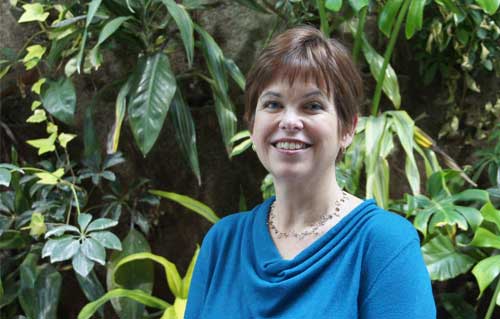
Teaching excellence that connects students to the community
Environment prof engages students in community-based projects for learning that goes beyond marks

Environment prof engages students in community-based projects for learning that goes beyond marks
By Suzanne Bowness Marketing and Strategic CommunicationsTo engage students about ways to improve local government, professors might ask them to write an essay on how a bylaw works.
To engage students in her second-year Politics of Sustainable Communities course, recently retired associate professor Mary Louise McAllister called a few members of city staff and councillors and arranged to have students pitch their own sustainability bylaws at a council meeting.
McAllister, now an adjunct professor, says she pursued community-based learning experiences for her students because the real world provides them with a motivation that goes beyond marks.

“If you're making a presentation in council chambers, you not only have a sense of the kind of things you might be doing when you graduate, you want to do a good job and hope that your ideas have some impact,” she says.
“Councillors really liked the idea because it's a way to reach the university students and to interact with them about their ideas. There's a real need to have an understanding of what the students think is important. More than that, they want to encourage students to take an interest in local government.”
Honoured in June with one of the university’s annual distinguished teacher awards, McAllister was also a Faculty of Environment teaching fellow who introduced the GreenTEA Blog. She joined Waterloo in 1996 after working as a faculty member at the University of Northern British Columbia. Before that she worked and taught at Queen’s University. She received her PhD from Queen’s in 1990.
McAllister introduced her students to other community experiences such as taking them on trips to Kitchener’s Working Centre, a non-profit cooperative focused on social justice, inclusion and sustainability. Students frequently end up volunteering there for summers and even years after. Other regular field trip destinations included the Residential Energy Efficiency Project house, now run by a former graduate student, and St. Jacob’s, where students learn about traditional ways of living.
McAllister says there's a risk to avoiding this type of collaborative learning that moves beyond the traditional approach. “People are always worried about taking risks outside the classroom, but it can also be a risk to only lecture at students. Finding ways to engage students in collaborative learning enhances the experience for everyone - teachers included.”
McAllister has taken early retirement to focus on some other commitments. She won’t be a complete stranger to UW though. As an adjunct faculty member in Environment and Resource Studies she continues to serve as a committee member for graduate students.

Read more
Here are the people and events behind some of this year’s most compelling Waterloo stories

Read more
Meet the 14 exceptional students representing Waterloo’s newest grads

Read more
GreenHouse awards $10,000 to student ventures and changemakers aiming to transform livelihoods within disadvantaged communities
The University of Waterloo acknowledges that much of our work takes place on the traditional territory of the Neutral, Anishinaabeg, and Haudenosaunee peoples. Our main campus is situated on the Haldimand Tract, the land granted to the Six Nations that includes six miles on each side of the Grand River. Our active work toward reconciliation takes place across our campuses through research, learning, teaching, and community building, and is co-ordinated within the Office of Indigenous Relations.